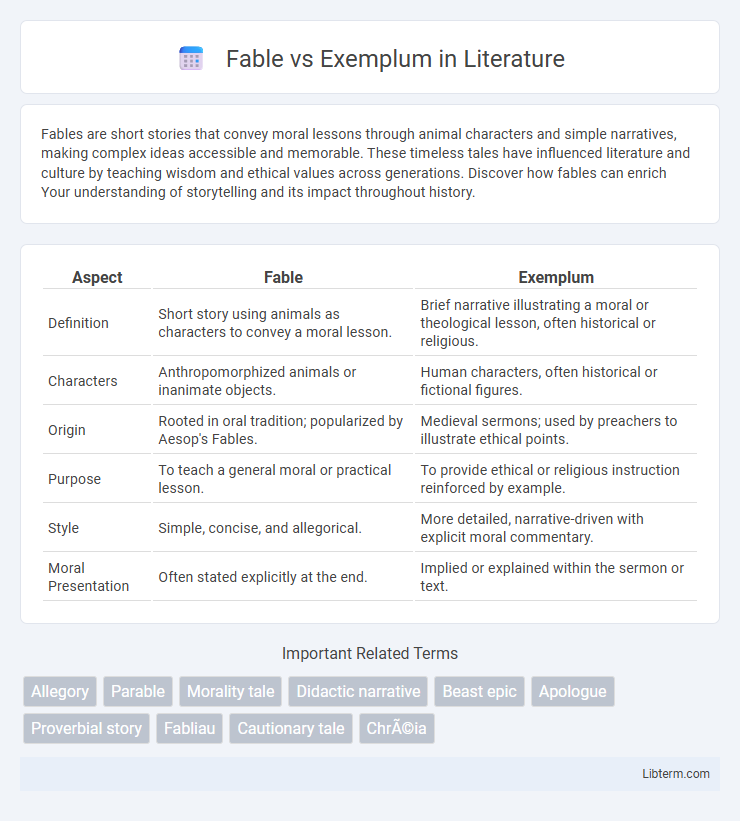Fables are short stories that convey moral lessons through animal characters and simple narratives, making complex ideas accessible and memorable. These timeless tales have influenced literature and culture by teaching wisdom and ethical values across generations. Discover how fables can enrich Your understanding of storytelling and its impact throughout history.
Table of Comparison
| Aspect | Fable | Exemplum |
|---|---|---|
| Definition | Short story using animals as characters to convey a moral lesson. | Brief narrative illustrating a moral or theological lesson, often historical or religious. |
| Characters | Anthropomorphized animals or inanimate objects. | Human characters, often historical or fictional figures. |
| Origin | Rooted in oral tradition; popularized by Aesop's Fables. | Medieval sermons; used by preachers to illustrate ethical points. |
| Purpose | To teach a general moral or practical lesson. | To provide ethical or religious instruction reinforced by example. |
| Style | Simple, concise, and allegorical. | More detailed, narrative-driven with explicit moral commentary. |
| Moral Presentation | Often stated explicitly at the end. | Implied or explained within the sermon or text. |
Introduction to Fable and Exemplum
Fables are short, fictional stories that use anthropomorphic animals or objects to convey moral lessons, often ending with a clear, concise moral. Exempla are brief illustrative anecdotes or narratives used in medieval sermons and literature to reinforce ethical or religious points through real-life examples or allegories. Both forms serve as didactic tools, but fables emphasize imaginative storytelling while exempla rely on persuasive, often historical or plausible, illustrations.
Definition of Fable
A fable is a short narrative featuring anthropomorphic animals or objects that conveys a moral lesson through simple yet impactful storytelling. This literary form uses concise plots and relatable characters to illustrate ethical principles and human behavior. Known for its clarity and universality, the fable often culminates in a clear, didactic message intended to instruct readers of all ages.
Definition of Exemplum
Exemplum is a rhetorical device or short narrative used in literature and sermons to illustrate a moral lesson or principle through a concrete example. Unlike a fable, which often features anthropomorphic animals and serves as a straightforward moral tale, exempla are typically drawn from real-life events, historical anecdotes, or religious texts and aim to persuade or instruct an audience by demonstrating ethical behavior. This form of storytelling is particularly prominent in medieval literature, where exempla were essential for reinforcing doctrinal teachings and ethical conduct.
Origins and Historical Context
Fables originated in ancient oral traditions, prominently attributed to Aesop in ancient Greece, serving as simple stories with moral lessons often involving animals as characters. Exempla emerged in the medieval period within Christian sermon literature, used by preachers to illustrate moral points and reinforce doctrinal teachings through real or fictional anecdotes. While fables emphasize universal morals and storytelling, exempla functioned primarily as didactic tools in ecclesiastical contexts during the Middle Ages.
Key Characteristics of Fable
Fables are concise narrative tales typically featuring anthropomorphic animals that convey a moral lesson, emphasizing simplicity and clarity. They often utilize straightforward plots with clear cause-and-effect relationships, making ethical teachings accessible across cultures and ages. Unlike exempla, fables prioritize universal morals delivered through symbolic characters rather than detailed historical or religious contexts.
Key Characteristics of Exemplum
Exemplum is a narrative form that uses a concise, illustrative story to convey a moral lesson, often grounded in historical or religious contexts. It emphasizes clear, memorable examples demonstrating virtuous or sinful behavior to teach ethical principles effectively. Unlike fables that employ anthropomorphic animals, exempla feature human characters and realistic scenarios to reinforce their instructive purpose.
Purposes and Functions in Literature
Fables serve to teach moral lessons through simple, often animal-led narratives that emphasize ethical conduct and practical wisdom in a concise format. Exempla function as illustrative stories within larger texts, commonly used in sermons or rhetoric, to provide concrete examples supporting moral or theological arguments. Both forms aim to instruct audiences but differ in structure and context, with fables being standalone tales and exempla operating as rhetorical evidence.
Differences Between Fable and Exemplum
Fables are short narratives that use animals as characters to convey moral lessons, often emphasizing simplicity and universal truths, while exempla are brief stories drawn from historical, religious, or folkloric sources to illustrate a particular virtue or vice. Fables typically utilize allegory and anthropomorphism to teach ethical principles, whereas exempla rely on realistic or anecdotal evidence to persuade or support a broader argument. The primary difference lies in the method and source: fables are fictional and symbolic, exempla are factual or plausible exemplifications used in rhetorical or homiletic contexts.
Famous Examples from Literature
A fable uses anthropomorphic animals to convey moral lessons, exemplified by Aesop's "The Tortoise and the Hare," which emphasizes perseverance. Exemplum, a brief narrative illustrating a moral point, frequently appears in medieval literature such as Geoffrey Chaucer's "The Canterbury Tales," where characters share instructive anecdotes. Both genres serve didactic purposes but differ in style: fables use straightforward storytelling with animals, while exempla rely on human characters and historical or religious contexts.
Impact and Significance in Modern Storytelling
Fables, with their concise narratives and moral lessons, have significantly shaped modern storytelling by providing clear ethical guidance and universal themes that resonate across cultures. Exempla, often rooted in historical or religious contexts, enhance storytelling by offering concrete examples that illustrate moral truths and inspire reflective thought in contemporary audiences. Both forms impact modern narratives by enriching character development and thematic depth, reinforcing values that inform social behavior and cultural identity.
Fable Infographic

 libterm.com
libterm.com